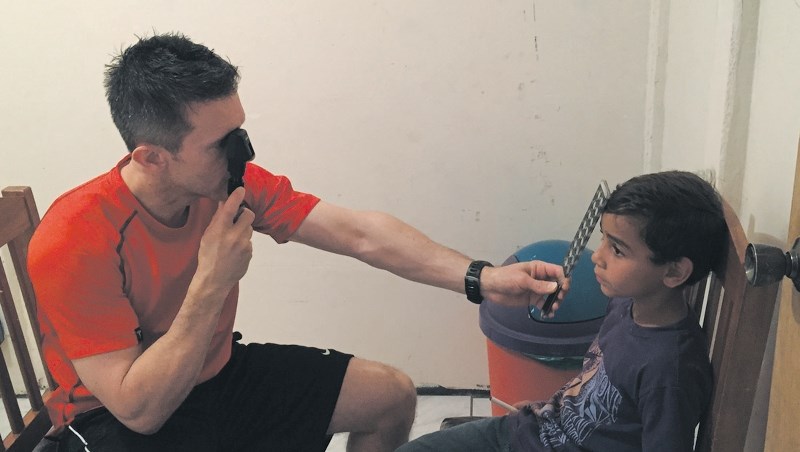For 240 Costa Ricans, things are looking a little brighter.
Cochrane’s Dr. Tom Wilk and his team at Mountain View Optometry have returned from the Central American nation after travelling there for a week to provide eye care for people who may not have other means to receive it.
Wilk, Dr. Michele Naruszewicz and support staff Hannah Warkentin and Kaila Pharis headed to Perez Zeledon, a remote mountainous area of small farming villages hit hard by the 2008 global financial crisis and then by a strain of fungus that attacks coffee plants, according to the Cochrane optometrist.
“The issue in Costa Rica is that health care does exist in big cities but you have to be able to access it,” Wilk said. “If somebody didn’t go to them to provide those services, they just wouldn’t get it.”
That means those living in the countryside have to travel many hours or days in order to get care – a major obstacle since many get around by foot or horseback. With the poverty rate over 20 per cent, many Costa Ricans – especially those in the countryside – face financial hardship taking time to travel for services.
“You have to travel so far to get anywhere. They can’t afford to take off for a week and pay for health care,” Pharis said.
One woman walked five hours to their location with her four children to get treatment.
“That’s a testament to just how important this is to them,” Wilk said. The team treated a variety of disorders, such as near- and farsightedness, astigmatism and presbyopia, which was the most common ailment Wilk observed.
Presbyopia is the gradual loss of the eye’s ability to focus on nearby objects. Such disorders are classified as refractive conditions, which means they can be treated by wearing corrective eye wear – a simple fix in Canada, but not for the people Wilk’s team treated in Costa Rica.
With an average high temperature of 30 degrees Celsius for March, sun exposure is another factor rural Costa Ricans have to contend with.
“They’re working sun up to sun down in the fields; they’re not really aware about how much that damages their eyes,” Pharis said.
Many are also exposed to allergens like dust and pollen while working outside.
Although lack of time and the language barrier didn’t allow for much interaction, Pharis said many of the workers were “ecstatic” to receive sunglasses, whether men’s or women’s glasses.
Wilk said they donated 117 glasses along with 130 sunglasses over the course of their time in Costa Rica.
The trip was organized through Canadian Vision Care (CVC) a charity that aims to provide eye care services in developing nations. The organization covered the cost of any needed eyewear and loaned eye examination equipment for Wilk and his team to use.
The Lions Club of San Isidro de El General was also instrumental in organizing their trip’s logistics, arranging food, transportation and setting up the treatment locations. The club got in contact with a local optometrist who took the prescription orders and organized the deliveries.
Wilk said it was important to make the most of their time in the area, because of the singular nature of the trip.
“We’re so use to looking at eye care as an ongoing commitment, but we know this is going to be a one-shot deal for them. So if we can give them any advice or any referrals or prescriptions of any kind that will improve their quality of life, we have to do that because they may not get any care at all moving forward.”
When asked about what more needs to be done to improve medical care for more vulnerable Costa Ricans, Wilk proscribed it to improving how money is spent on its system. “I think Costa Rica as a country is going in the right direction, because they do have health care infrastructure, but they need to put more dollars towards it.”
Wilk would like to see more effort put towards improving accessibility as well.
Wilk and his team hope to undertake future trips and are still accepting bottles at their office, 404 1st Street West between Monday to Friday from 9 a.m. to 5 p.m.
People can also make a monetary donation online at mountainviewoptometry.myevent.com.




